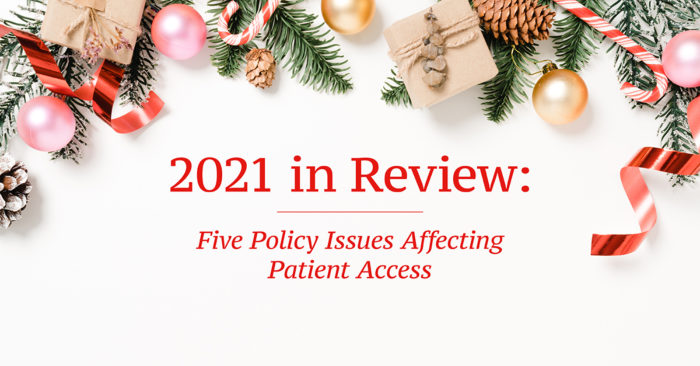For the second year in a row, COVID-19 dominated health care headlines, but it wasn’t the only topic that sparked debate. Here’s a look back at five issues that shaped health policy in 2021.

1. Nearly two years into the pandemic, COVID-19 still shapes everyday life.
Most experts agree, the coronavirus is a part of the world’s “new normal.” The pandemic continues to influence health policy, and it will have long-lasting effects on issues such as mental health, obesity and the use of telehealth.
- INFOGRAPHIC: Why Employers Should Prioritize Cardiovascular Care after COVID-19
- BLOG: Telemedicine Co-Pays Are Back. Now What?
- BLOG: Pandemic Rocked Cystic Fibrosis Patients’ Economic Stability
- PAPER: Mental Health Care Reform After the Pandemic
- BLOG: Parents: RSV is Still Around, Trust Me
2. Changing health disparities requires more than acknowledging they exist.
The disproportionate impact of disease borne by racial, ethnic and gender minorities won’t be erased quickly. Rather, it will take years of deliberate action and tailored approaches to level the playing field on care for conditions ranging from asthma to cancer to premature birth.
- BLOG: Making Telemedicine Work for Underserved Communities
- INFOGRAPHIC: Steps to Eliminating Hepatitis C: Tailor Strategies to At-Risk Populations
- BLOG: Putting My Experience to Work to Reduce Prematurity
- INFOGRAPHIC: When Health Technology Assessment Discriminates
- BLOG: How Men Can Grapple With Gout
3. When it comes to talking about the value of medical innovation, providers’ and patients’ voices deserve more attention.
Political pundits, angry lawmakers and even insurance companies have been taking center stage in the ongoing conversation about medical innovation. But no group is more appropriate to lead the narrative about the value of innovative diagnostics and treatments than the patients who use them and the providers who treat those patients.
- BLOG: Imaging the Future of Medicine Without Innovation
- BLOG: Reclaiming Control Thanks to Novel Diagnostics and Treatments
- PAPER: Biosimilars: Expanding Options for Cancer Care
- BLOG: For Some, Step Therapy is a Matter of Life and Death
- BLOG: Prescription Digital Therapeutics Emerge as Health Care’s Newest Frontier
4. “Mission creep” defined the work of influential health technology assessment organization.
People around the world cheered at the investment and value of coronavirus vaccines that were developed at warp-speed. Yet when it comes to the value of other new treatments, the Institute for Clinical and Economic Review draws a hard line. Despite patients’ and providers’ first-hand testimony, the organization’s health economists repeatedly found other groundbreaking drugs of little value, setting up long-term battles over access.
- BLOG: Cancer and the Long-Term Costs of ICER’s Short-Term Thinking
- ONE-PAGER: ICER Mixes Up Priorities in Asthma Review
- BLOG: ICER Crosses the Center Line
- VIDEO: Value, Access & Asthma
- BLOG: State Legislatures Explore How to Measure a Drug’s Value
5. During a year of uncertainty, insurers’ “no” remained a sure bet.
Rather than promote better health and access to treatment, insurers and pharmacy benefit managers, with rare exception, doubled down on cost-cutting tactics. Excessive utilization management protocols left patients with just about any condition jumping through hoops to get the medication they needed. Providers, meanwhile, were sidelined with a dizzying load of paperwork.
- VIDEO: Skin Conditions & Health Insurance Barriers
- BLOG: Rx Exclusion Lists Shut Patients Out
- VIDEO: Access Barriers for Parkinson’s Patients
- INFOGRAPHIC: Rare Diseases and Cost Sharing
- VIDEO: Non-Medical Switching: No Big Deal?
IfPA’s policy blog will resume January 4, 2022, for another year of insights on these and other health policy issues. Happy New Year!

